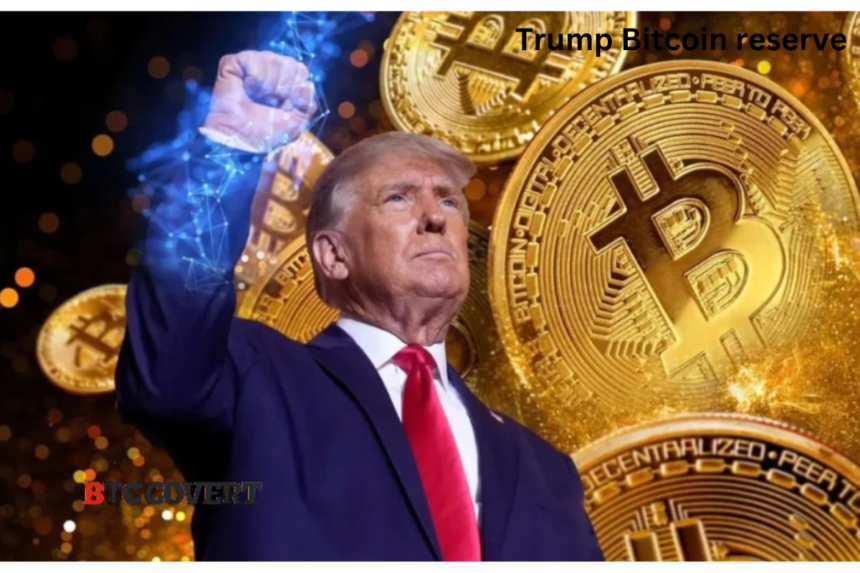Trump’s Bitcoin Reserve, Plan Sparks Debate on U.S. Crypto. Donald Trump recently revealed intentions to create a U.S. Bitcoin reserve. So, establishing the country at the forefront of the cryptocurrency revolution is causing waves in global financial and political spheres. Framed as a calculated attempt to strengthen economic sovereignty and offset foreign digital currency aspirations. This project begs important issues regarding the motives, consequences, and viability of a government-owned crypto stockpile. Trump’s Bitcoin Reserve Plan Sparks Debate on U.S. Crypto. from mistrust to supporting Bitcoin as a national reserve asset highlights a seismic change in how legislators see the function. The distributed currencies in geopolitics and economics as arguments over digital assets get more heated.
Geopolitical Strategy
Trump Bitcoin reserve is driven fundamentally by a geopolitical chess match. China’s fast implementation of its central bank digital currency (CBDC), the digital yuan, has raised questions over the decline of the US dollar’s worldwide supremacy. China wants to question dollar hegemony and increase its influence by guiding the digital yuan in Belt and Road Initiative projects and cross-border trade.
One counterbalance might come from a U.S. Bitcoin reserve. Unlike the state-owned digital yuan of China, Bitcoin runs on a distributed network in line with American ideals of financial freedom. Advocates of Trump’s approach contend that stockpiling Bitcoin would diversify the country’s assets. The less reliance on conventional monetary systems, and show technological leadership. At a recent rally, Trump said, “We must dominate the crypto space,” portraying the reserve as a defence against “foreign financial threats.”
Critics counter that given Bitcoin’s volatility and non-state character, it is not practically able to offset the strategic risks China’s CBDC generates. Unlike the dollar or gold, Bitcoin is not naturally stable, which calls questions about its geopolitical usefulness.
Economic Motivations

The plan also captures mounting concern about inflation and the U.S. national debt, which will rise to $34 trillion in 2023. With only 21 million coins available, Trump’s Bitcoin Reserve Plan Sparks Debate on U.S. Crypto. is positioned as a possible counterpoint against devaluation of fiat money. The U.S. could theoretically safeguard its reserves from inflationary pressures by acquiring Bitcoin, following tactics used by companies like MicroStrategy, which owns more than 214,000 Bitcoin.
The U.S. government already owns billions in Bitcoin acquired in cybercrime cases; Trump’s Bitcoin reserve team has hinted at getting Bitcoin through open-market purchases, mining operations, or leveraging stolen assets from criminal investigations. Such a stockpile may also draw crypto-oriented investment, which would drive blockchain technology and allied sector growth.
Political Calculations
Trump Bitcoin reserve is unquestionably political. With 52 million Americans hooked on cryptocurrency, the crypto community has become a powerful voting force. Promoting a Bitcoin reserve appeals to younger voters who are disappointed with conventional banking systems, tech entrepreneurs, and libertarians. This approach also isolates him from Democratic competitors, many of whom support tougher crypto laws.
Senator Elizabeth Warren has demanded anti-money laundering laws that can impede creativity. Trump’s embrace of Bitcoin inspires those who see it as a representation of financial independence. The action fits Trump’s more general campaign ideas of nationalism and inventiveness. Positioning the United States as a crypto leader helps him to appeal to nostalgia for American technical superiority by offering forward-looking economic ideas.
Implementation Challenges

Creating a Bitcoin reserve calls for enormous logistical challenges. Given the checkered record of digital infrastructure underwritten by the U.S. government, custody solutions for preserving such assets call for military-grade cybersecurity safeguards to prevent attacks. Another challenge is regulatory clarity; opposing state and federal regulations could hinder management and acquisitions.
Equally important is public confidence. According to polls, people have mixed opinions on government intervention in cryptocurrencies; some worry overreach or mismanagement. tweeted Tesla CEO Elon Musk, capturing libertarian issues, “The same institution that prints endless dollars shouldn’t control Bitcoin.”
Conclusion
Trump’s Bitcoin reserve, the idea is a high-stakes gamble combining geopolitics, finance, and philosophy. Although it addresses real worries about technical leadership and dollar weakness. The risks—volatility, environmental effect, and implementation complexity—are significant.
The endeavour also represents a larger trend: countries increasingly see cryptocurrencies not as niche assets but rather as strategic tools. Whether the United States can strike a balance between stability and innovation will define whether Trump’s vision serves as a warning story or a road map for the future. The argument on America’s crypto path will only get more heated as the 2024 election gets underway. Therefore, it will influence the financial environment for the next decade.










